► The best EV charging tariffs
► How to charge at home for less
► Updated for July 2024 price cap
One of the key reasons for buying an electric car is to reduce your day-to-day running costs. But working out the most cost-effective way of recharging an EV can be tricky. Fortunately, one way of easily helping keep your costs in check is by switching to a dedicated EV charging tariff for your domestic energy.
This is because most EV owners primarily recharge at home, which is considerably cheaper than using public rapid charging stations. Even so, it has the potential to add substantially to your electricity bill there are tariffs aimed specifically at EV owners that help reduce the cost by taking advantage of cheaper electricity rates available during off-peak hours.
We’ve gone through the facts and figures for the various EV charging tariffs available – there are ten in total – and crunched the numbers to come up with what we think are the five best options for different types of EV owners.
All the tariffs highlighted here include your total energy usage, because there are no tariffs that allow you separate out EV charging. Our figures are based on some very broad assumptions, so we recommend that you get you a personal quote before switching to a particular energy provider.
Our calculations are based on a typical family-size electric car that covers 9000 miles a year and achieves an energy efficiency of 3.5 miles per kWh. That’s an average of 25 miles per day, using 7kWh of electricity. Over the course of a year, the car would use 2571.43kWh.
We’re also assuming an average household dual-fuel energy usage of 2900kWh of electricity and 12,000kWh of gas – those figures are from Ofgem. We’ve calculated the cost of electricity based on each company’s peak rates, with gas charged at the UK average of 5.48p per kWh. On top of all that, we’ve lumped the cost of each company’s daily standing charge.
Here are the figures presented in our analysis:
- The time of day that off-peak energy is available
- The potential amount of charge that can be added to an EV’s battery in that time, using a typical 7.4kW wall box charger
- The peak and off-peak cost of electricity, per kWh
- The energy provider’s standing charge
- The annual cost of the 2571.43kWh of electricity our example EV would consume
- The total cost per year of a typical household’s energy, inclusive of EV charging
The best EV charging tariffs
British Gas – Electric Driver v3
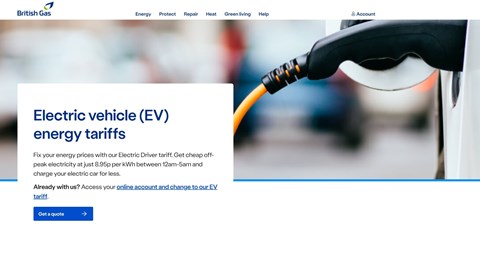
Best for all-purpose EV charging
Pros: Open to new and existing customers, fixed rate, no car or charger restrictions
Cons: Not the cheapest deal, or the longest off-peak hours
Off-peak hours: 00:00 to 05:00 Potential charge added: 37.0kWh/129.5 miles Peak/off-peak cost (per kWh): 26.86p/7.90p Standing charge (per day): 56.22p Annual cost to charge an EV: £203.14 Total annual bill: £1844.88
British Gas’s Electric Driver v3 tariff isn’t the cheapest deal here – not by a long shot. However, for many people, it’ll be the most convenient. Unlike some of our other contenders, it’s open to both new and existing customers, on dual-fuel and electric-only contracts, making it easy to sign up for.
It’s also compatible with all EVs – and plug-in hybrids – and all domestic EV chargers. The costs are fixed until 31 May 2025 as well. The deal isn’t just restricted to EV charging, either, because you can also take advantage of the lower off-peak rate for all your appliances. The off-peak hours are only average but the 37kWh of charge you can get in that time should provide around 130 miles of range, covering most day-to-day needs.
E.ON Next – Next Drive
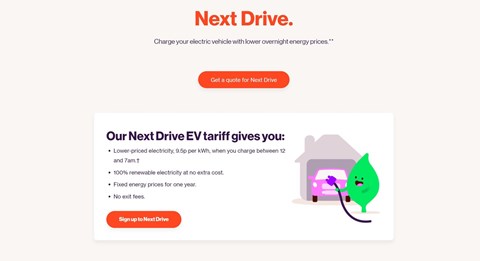
Best for high-mileage EV drivers
Pros: Long off-peak hours, fixed rate for one year, available to all customers
Cons: The most expensive tariff of our picks, dual-fuel only
Off-peak hours: 00:00 to 07:00 Potential charge added: 51.8kWh/181.3 miles Peak/off-peak cost (per kWh): 29.71p/6.90p Standing charge (per day): 60.10p Annual cost to charge an EV: £177.43 Total annual bill: £1915.99
E.ON Next’s Next Drive tariff is the most expensive across the board, here. So why have we placed it second? Well, that’s because its off-peak period lasts by far the longest – a full seven hours. That’s long enough to add 51.8kWh to our typical EV’s battery, which equates to 180 miles of range. If you regularly rack up a lot of miles, it’s absolutely ideal.
The deal is available to new and existing customers on dual-fuel contracts, and there are no restrictions on car or charger compatibility. The rates are fixed for one year from the start of the contract.
Ovo Energy – Charge Anytime
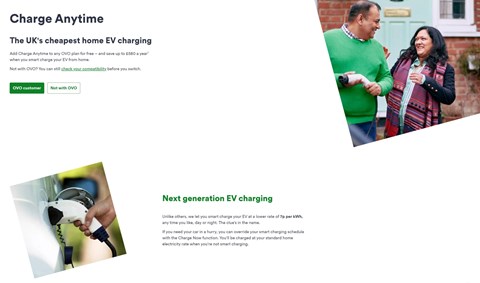
Best for EV owners who want flexibility
Pros: Off-peak rate available at any time of day, low unit charges, clever app
Cons: Only compatible with certain cars and EV chargers, existing customers only
Off-peak hours: Anytime Potential charge added: As much as you want Peak/off-peak cost (per kWh): 24.50p/7.00p Standing charge (per day): 60.10p Annual cost to charge an EV: £180.00 Total annual bill: £1767.47
Ovo Energy’s Charge Anytime deal is the cheapest dual-fuel one here by some margin, saving you nearly £80 a year off your full bill. The standing charge is relatively high, but the peak and off-peak rates are conspicuously low. But that’s not the most appealing aspect.
Interestingly, Ovo doesn’t have off-peak hours as such. Instead, you plug your car in then use the app to instruct the car to recharge when electricity is cheapest. You’ll initially be charged at the full rate, but the discount for EV charging is credited back to your account.
There are downsides. Charge Anytime is only available to Ovo’s existing customers, it’s only compatible with certain brands of car and Ohme and Indra chargers.
EDF – GoElectric
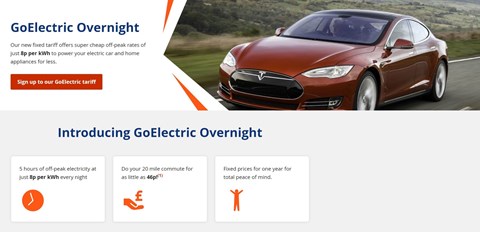
Best for all-round value
Pros: Good value, off-peak rate applies to all electricity use – not just your EV charger
Cons: Existing customers only, unit costs are quite high
Off-peak hours: 00:00 to 05:00 Potential charge added: 37.0kWh/129.5 miles Peak/off-peak cost (per kWh): 25.47/8.99p Standing charge (per day): 60.31p Annual cost to charge an EV: £231.71 Total annual bill: £1845.53
EDF’s GoElectric is the second most expensive tariff here – albeit not by much. Still, it works out as excellent value overall – especially as the lower rate applies to all your appliances – and the midnight to 5 a.m. off-peak period can realise 130 miles of range.
There are car and charger compatibility issues but GoElectric is available to new and existing customers, and the rates are fixed until 31 September 2025.
Octopus Energy – Intelligent Octopus Go
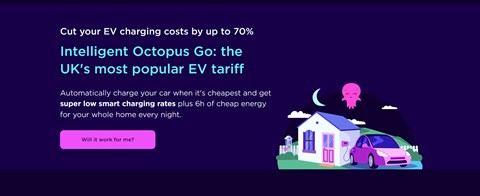
Best for bargain-hunters
Pros: Low costs, recharges when electric is cheapest
Cons: Tight restrictions on charger compatibility, you’ll need a separate gas tariff
Off-peak hours: 23:30 to 05:30 Potential charge added: 44.4kWh/155.4 miles Peak/off-peak cost (per kWh): 30.41p/7.50p Standing charge (per day): 51.32p Annual cost to charge an EV: £192.86 Total annual bill: £1262.07
Octopus Energy’s Intelligent Octopus Go tariff is similar to Ovo’s in that your car recharges when electricity is cheapest, even if that falls outside the stated off-peak hours. And Octopus says the off-peak rate you pay will never exceed 7.50p, even if the actual price on a particular day doesn’t drop that low. You just plug your car in and enter how much charge you need via the Octopus app and it’ll recharge automatically.
There are complications, though. The tariff is only compatible with ‘official’ chargers supplied for cars made by VW Group, Tesla, Jaguar Land Rover, Ford, Kia and BMW Group, or an Ohme charger. And it’s only available on an electric-only basis – if you need gas, you’ll have to sign up to a separate tariff at extra cost.